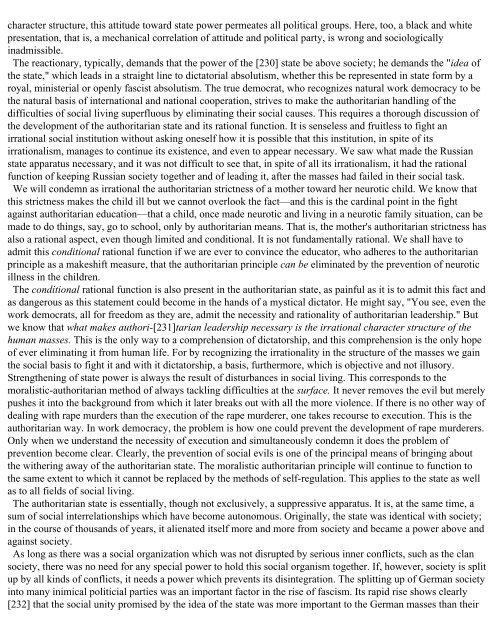The Mass Psychology of Fascism - Anxiety Depression Self-Help
The Mass Psychology of Fascism - Anxiety Depression Self-Help
The Mass Psychology of Fascism - Anxiety Depression Self-Help
You also want an ePaper? Increase the reach of your titles
YUMPU automatically turns print PDFs into web optimized ePapers that Google loves.
character structure, this attitude toward state power permeates all political groups. Here, too, a black and white<br />
presentation, that is, a mechanical correlation <strong>of</strong> attitude and political party, is wrong and sociologically<br />
inadmissible.<br />
<strong>The</strong> reactionary, typically, demands that the power <strong>of</strong> the [230] state be above society; he demands the "idea <strong>of</strong><br />
the state," which leads in a straight line to dictatorial absolutism, whether this be represented in state form by a<br />
royal, ministerial or openly fascist absolutism. <strong>The</strong> true democrat, who recognizes natural work democracy to be<br />
the natural basis <strong>of</strong> international and national cooperation, strives to make the authoritarian handling <strong>of</strong> the<br />
difficulties <strong>of</strong> social living superfluous by eliminating their social causes. This requires a thorough discussion <strong>of</strong><br />
the development <strong>of</strong> the authoritarian state and its rational function. It is senseless and fruitless to fight an<br />
irrational social institution without asking oneself how it is possible that this institution, in spite <strong>of</strong> its<br />
irrationalism, manages to continue its existence, and even to appear necessary. We saw what made the Russian<br />
state apparatus necessary, and it was not difficult to see that, in spite <strong>of</strong> all its irrationalism, it had the rational<br />
function <strong>of</strong> keeping Russian society together and <strong>of</strong> leading it, after the masses had failed in their social task.<br />
We will condemn as irrational the authoritarian strictness <strong>of</strong> a mother toward her neurotic child. We know that<br />
this strictness makes the child ill but we cannot overlook the fact—and this is the cardinal point in the fight<br />
against authoritarian education—that a child, once made neurotic and living in a neurotic family situation, can be<br />
made to do things, say, go to school, only by authoritarian means. That is, the mother's authoritarian strictness has<br />
also a rational aspect, even though limited and conditional. It is not fundamentally rational. We shall have to<br />
admit this conditional rational function if we are ever to convince the educator, who adheres to the authoritarian<br />
principle as a makeshift measure, that the authoritarian principle can be eliminated by the prevention <strong>of</strong> neurotic<br />
illness in the children.<br />
<strong>The</strong> conditional rational function is also present in the authoritarian state, as painful as it is to admit this fact and<br />
as dangerous as this statement could become in the hands <strong>of</strong> a mystical dictator. He might say, "You see, even the<br />
work democrats, all for freedom as they are, admit the necessity and rationality <strong>of</strong> authoritarian leadership." But<br />
we know that what makes authori-[231]tarian leadership necessary is the irrational character structure <strong>of</strong> the<br />
human masses. This is the only way to a comprehension <strong>of</strong> dictatorship, and this comprehension is the only hope<br />
<strong>of</strong> ever eliminating it from human life. For by recognizing the irrationality in the structure <strong>of</strong> the masses we gain<br />
the social basis to fight it and with it dictatorship, a basis, furthermore, which is objective and not illusory.<br />
Strengthening <strong>of</strong> state power is always the result <strong>of</strong> disturbances in social living. This corresponds to the<br />
moralistic-authoritarian method <strong>of</strong> always tackling difficulties at the surface. It never removes the evil but merely<br />
pushes it into the background from which it later breaks out with all the more violence. If there is no other way <strong>of</strong><br />
dealing with rape murders than the execution <strong>of</strong> the rape murderer, one takes recourse to execution. This is the<br />
authoritarian way. In work democracy, the problem is how one could prevent the development <strong>of</strong> rape murderers.<br />
Only when we understand the necessity <strong>of</strong> execution and simultaneously condemn it does the problem <strong>of</strong><br />
prevention become clear. Clearly, the prevention <strong>of</strong> social evils is one <strong>of</strong> the principal means <strong>of</strong> bringing about<br />
the withering away <strong>of</strong> the authoritarian state. <strong>The</strong> moralistic authoritarian principle will continue to function to<br />
the same extent to which it cannot be replaced by the methods <strong>of</strong> self-regulation. This applies to the state as well<br />
as to all fields <strong>of</strong> social living.<br />
<strong>The</strong> authoritarian state is essentially, though not exclusively, a suppressive apparatus. It is, at the same time, a<br />
sum <strong>of</strong> social interrelationships which have become autonomous. Originally, the state was identical with society;<br />
in the course <strong>of</strong> thousands <strong>of</strong> years, it alienated itself more and more from society and became a power above and<br />
against society.<br />
As long as there was a social organization which was not disrupted by serious inner conflicts, such as the clan<br />
society, there was no need for any special power to hold this social organism together. If, however, society is split<br />
up by all kinds <strong>of</strong> conflicts, it needs a power which prevents its disintegration. <strong>The</strong> splitting up <strong>of</strong> German society<br />
into many inimical politicial parties was an important factor in the rise <strong>of</strong> fascism. Its rapid rise shows clearly<br />
[232] that the social unity promised by the idea <strong>of</strong> the state was more important to the German masses than their


